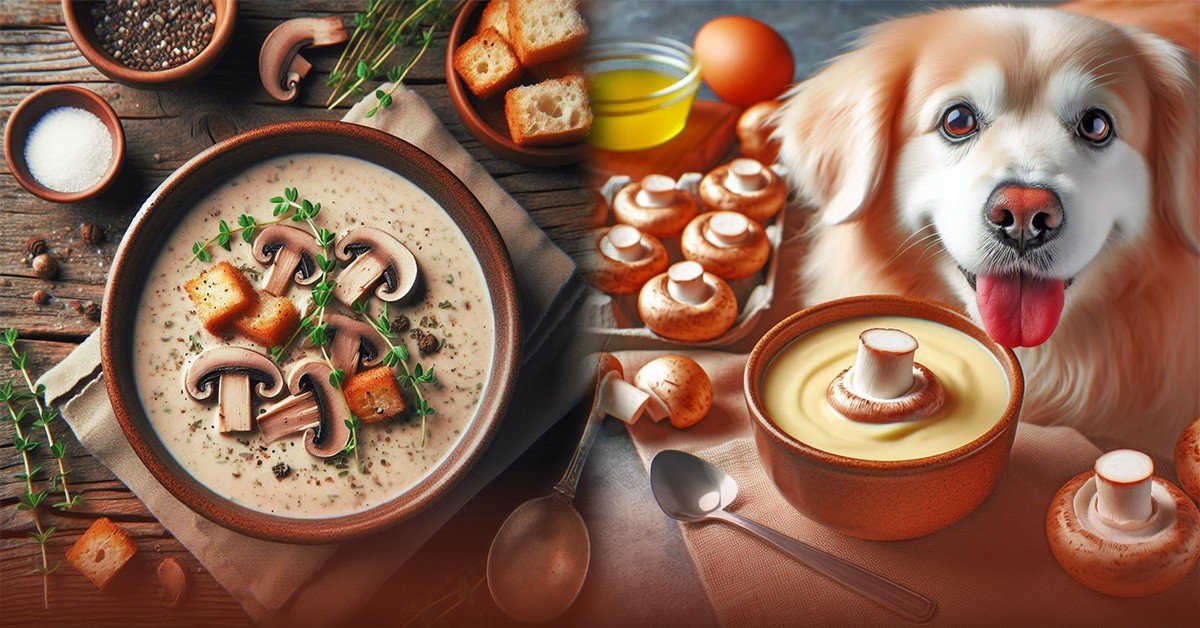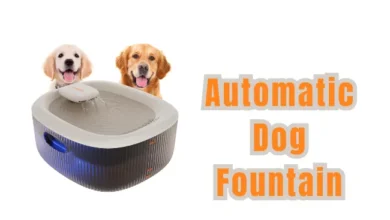
Can Dogs Eat Cream of Mushroom Soup? If you enjoy this creamy dish, you might wonder if it’s safe for your dog to have a taste. Cream of mushroom soup typically includes ingredients like mushrooms, cream, butter, garlic, onions, and salt. While some of these may seem harmless, certain ingredients can be harmful to your furry friend.
Garlic and onions are particularly concerning, as they are toxic to dogs and can lead to severe health issues. Additionally, store-bought versions often contain high sodium levels and preservatives, which can also pose risks. Understanding these ingredients is key to keeping your pup safe. Let’s dive into the details! So,let’s explore that- can dogs eat cream of mushroom soup?
Why Cream of Mushroom Soup Can Be Dangerous for Dogs
Can Dogs Eat Cream of Mushroom Soup? Understanding the risks involved is essential for every dog owner. While cream of mushroom soup might be a comforting dish for humans, it can pose significant dangers for our furry friends.
Garlic and Onions
- Red Blood Cell Damage: Garlic and onions contain compounds that can damage a dog’s red blood cells, leading to conditions like anemia. Symptoms may not appear immediately, making it crucial to monitor for any signs of distress.
High-Fat Content
- Risk of Pancreatitis: The cream and butter in this soup contribute to a high-fat content, which can trigger pancreatitis. This painful condition can lead to serious gastrointestinal upset and requires veterinary attention.
Excessive Sodium
- Dehydration and Kidney Strain: Many commercial soups contain high levels of sodium, which can lead to dehydration and increased blood pressure. Over time, excessive sodium intake can put a strain on your dog’s kidneys, leading to long-term health issues.
While cream of mushroom soup may be a delicious meal for humans, it carries risks that can endanger your dog’s health. Being aware of these dangers can help you make informed choices for your furry companion’s diet!
Symptoms to Watch for If Your Dog Consumes Cream of Mushroom Soup
Can Dogs Eat Cream of Mushroom Soup? If your dog accidentally consumes cream of mushroom soup, it’s crucial to be aware of the symptoms that might arise.
Garlic or Onion Poisoning
- Vomiting: One of the first signs to look for is vomiting, which can occur soon after ingestion.
- Lethargy: If your dog seems unusually tired or lacks energy, this could indicate a reaction.
- Weakness: Watch for signs of weakness, such as difficulty standing or walking.
Digestive Distress
- Diarrhea: Loose stools can result from the high-fat content or toxic ingredients in the soup.
- Bloating: If your dog’s abdomen appears swollen or feels hard, this could indicate gas buildup or gastrointestinal upset.
- Gas: Increased flatulence can also be a sign of digestive issues.
Signs of Dehydration
- Excessive Thirst: If your dog drinks more water than usual, it may be trying to counteract dehydration.
- Dry Gums: Check your dog’s gums; if they feel dry or sticky, this could indicate dehydration.
If you notice any of these symptoms after your dog consumes cream of mushroom soup, it’s essential to consult your veterinarian immediately. Early detection can make a significant difference in your dog’s health and well-being.
Is Homemade Cream of Mushroom Soup a Safer Option?
Can Dogs Eat Cream of Mushroom Soup? If you’re considering homemade options, it’s essential to know how to make them safer for your furry friend.
Remove Toxic Ingredients
- Omit Garlic and Onions: These ingredients are harmful to dogs and should never be included in any dog-friendly soup.
- Limit Salt: Reducing or eliminating salt can help prevent high sodium levels, which can lead to dehydration and kidney issues.
Use Healthier Alternatives
- Lower-Fat Options: Instead of heavy cream, consider using non-dairy milk or a low-fat dog-safe broth. This reduces the risk of pancreatitis and digestive upset.
- Add Safe Vegetables: Incorporate dog-friendly vegetables like carrots or peas for added nutrition without harmful effects.
Moderation is Key
- Serve Sparingly: Even homemade versions should be given in moderation. Too much fat or any unfamiliar ingredients can upset your dog’s stomach.
- Watch for Reactions: Always monitor your dog for any signs of digestive issues or allergies after trying new foods.
By making these adjustments, you can create a healthier soup option for your dog while ensuring their safety.
What to Do If Your Dog Eats Cream of Mushroom Soup
Can Dogs Eat Cream of Mushroom Soup? If your furry friend happens to eat cream of mushroom soup, it’s important to know how to respond effectively to protect their health. This soup can contain ingredients that are harmful to dogs, so being prepared is key.
Monitor for Symptoms
Watch for Digestive Upset:
- Vomiting: If your dog starts vomiting, it may indicate that their stomach is upset. This can happen due to the richness of the soup or the presence of harmful ingredients.
- Diarrhea: Loose stools are another common reaction that can arise from eating foods that don’t sit well with a dog’s digestive system.
- Upset Stomach: Look for signs of discomfort, such as pacing, whining, or an inability to settle down.
Look for Lethargy or Weakness:
- Unusual Fatigue: If your dog seems less energetic than usual or is not interested in their normal activities, it may be a cause for concern.
- Weakness: If your dog struggles to stand or appears weak, this may indicate a serious reaction, particularly if garlic or onions were involved.
Check for Pale Gums:
- Color Changes: Use a flashlight to check your dog’s gums. Healthy gums should be pink. If they appear pale or bluish, this could signal toxicity, particularly related to garlic or onion ingestion.
Immediate Action for Toxicity Symptoms:
If you observe any of the symptoms listed above, especially lethargy or pale gums, contact your veterinarian immediately. Quick action is crucial to address potential toxicity.
Be Prepared to Provide Information:
- Details Matter: When contacting your vet, provide information about the soup’s ingredients, how much your dog ate, and the time of ingestion. This helps the vet assess the situation more accurately.
- Follow Vet Recommendations: Your vet may suggest monitoring your dog at home or may advise bringing them in for an examination.
Ensure Hydration
- Encourage Drinking: Make sure your dog has access to fresh water at all times. Hydration is important, especially if they consumed a high-sodium soup.
Monitor Water Intake:
- Excessive Thirst: If your dog drinks a lot more than usual, this could indicate dehydration or a response to high sodium levels.
- Lack of Drinking: Conversely, if your dog refuses to drink water, this is also a concerning sign, and you should consult your vet.
Additional Considerations
- Prevention is Key: To avoid these situations in the future, keep cream of mushroom soup and other potentially harmful foods out of reach. Familiarize yourself with safe foods for your dog.
- Know Safe Alternatives: If you want to treat your dog, consider healthier options like plain, cooked mushrooms without seasoning or homemade broth using dog-safe ingredients.
Taking these steps can help ensure your dog’s well-being if they accidentally consume cream of mushroom soup. Always stay vigilant about their health and respond promptly to any signs of distress.
Safe and Healthy Alternatives to Cream of Mushroom Soup
Can Dogs Eat Cream of Mushroom Soup? If you’re a dog owner, you might wonder about safe alternatives to cream of mushroom soup. While this soup can be harmful to dogs, there are plenty of healthy options that your furry friend can enjoy without the risks. Let’s explore some safe and nutritious alternatives!
Plain, Cooked Mushrooms
- Moderation is Key: Plain, cooked mushrooms can be a tasty treat for dogs. They should be prepared without any seasoning, oils, or fats that can upset their stomachs.
- Nutritional Benefits: Mushrooms contain vitamins and minerals that can benefit your dog’s health, but they should only be given occasionally to avoid any digestive issues.
Homemade Low-Sodium Broths
- Dog-Friendly Vegetables: Create a low-sodium, fat-free broth using vegetables like carrots and peas. These ingredients are safe and can provide a flavorful, hydrating treat for your dog.
- Simple Recipe Ideas: Boil the vegetables in water, strain them, and serve the broth. This can be a great addition to your dog’s meals or enjoyed on its own.
Dog-Specific Treats
- Choose Wisely: Always opt for dog-specific treats that are free from harmful ingredients. Many brands offer treats designed to be nutritious and safe for dogs.
- Homemade Options: Consider making your own dog treats using safe ingredients. Recipes can include peanut butter, pumpkin, or oats, ensuring that your pup enjoys a healthy snack without the risks associated with cream of mushroom soup.
Why These Alternatives Are Better
- Avoid Harmful Ingredients: These alternatives eliminate toxic components like garlic and onions found in cream of mushroom soup.
- Promote Digestive Health: By choosing low-fat and low-sodium options, you support your dog’s overall digestive health and well-being.
- Tailored Nutrition: Homemade broths and treats allow you to control the ingredients, ensuring your dog gets the best nutrition without any harmful additives.
conclusion,
While cream of mushroom soup poses risks for dogs, there are plenty of safe and healthy alternatives to keep your furry friend happy and healthy. By choosing plain, cooked mushrooms, homemade broths, and dog-specific treats, you can provide your dog with delicious options that support their well-being.




